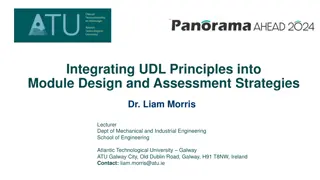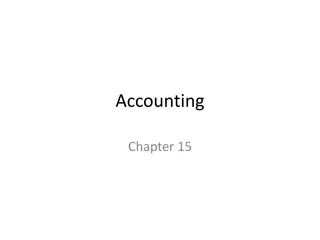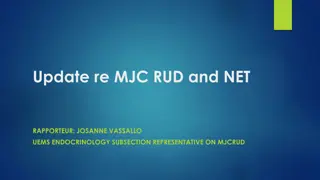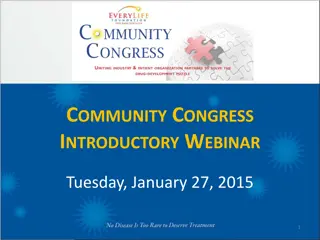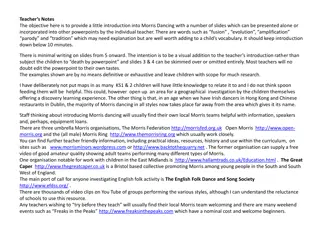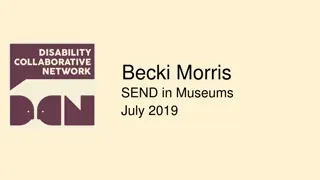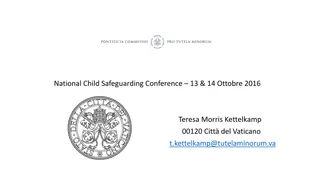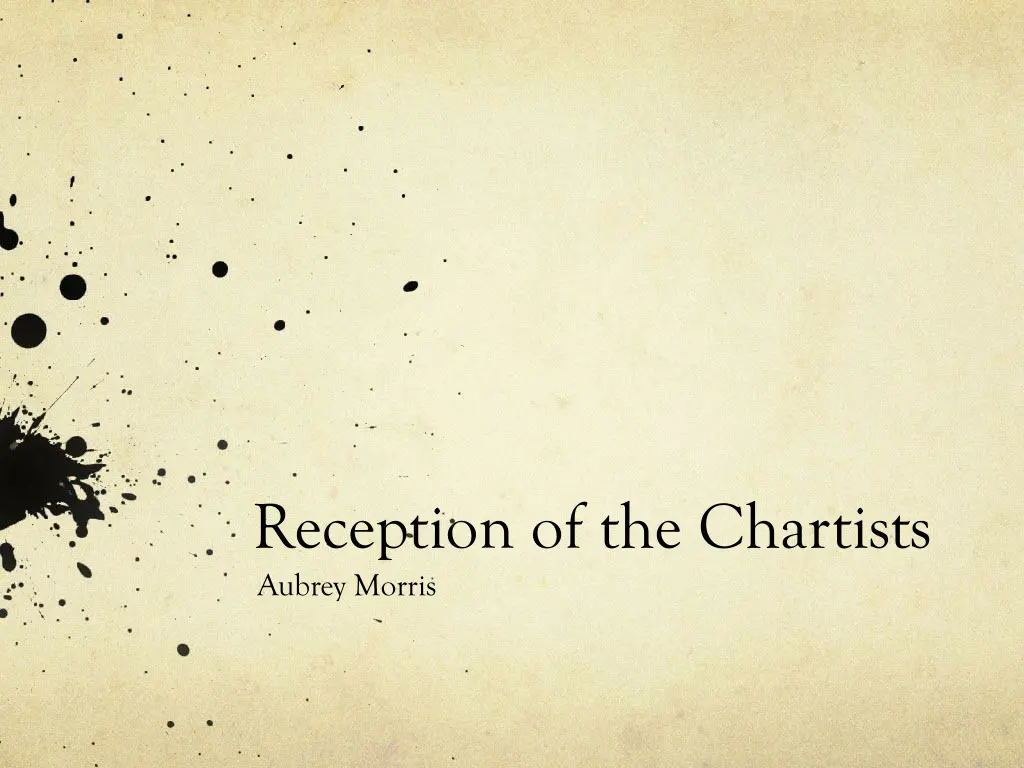
Reception of Chartists in Historical Context
Explore the historical reception of Chartists through images, hymns, religious sermons, and refutations. Learn about their interactions with Anglican priests, responses to biblical texts, and challenges to societal norms. Witness the complexity of their movement and the varying reactions they provoked in society.
Download Presentation

Please find below an Image/Link to download the presentation.
The content on the website is provided AS IS for your information and personal use only. It may not be sold, licensed, or shared on other websites without obtaining consent from the author. If you encounter any issues during the download, it is possible that the publisher has removed the file from their server.
You are allowed to download the files provided on this website for personal or commercial use, subject to the condition that they are used lawfully. All files are the property of their respective owners.
The content on the website is provided AS IS for your information and personal use only. It may not be sold, licensed, or shared on other websites without obtaining consent from the author.
E N D
Presentation Transcript
Reception of the Chartists Aubrey Morris
Hymn Reception https://books.google.com/books?id=sApgAAAAcAAJ &pg=PA1&dq=%22J.+A.+Jones%22+New+Church+S ongs+and+Ballads&hl=en&sa=X&ved=0CB4Q6AEwA GoVChMI2926rPmAxwIVRBuSCh1DTAQL#v=onep age&q=chartist&f=false
Religious Reception- J.W. Whittaker s Sermon to the Chartists Delivered August 4, 1839 to about 4,000 people (2). Chartists would hold 'sit-ins' at churches - they would send letters to Anglican priests, asking them to speak on specific Biblical texts about wealth and inequality, then show up to see what was preached. In the case of this sermon, they asked for James 5:1-6. Whittaker claims that "a large portion of the latter half of it was therefore never committed to paper, save by an effort of imperfect memory the day after its delivery." He assures his print audience that it's "very nearly identical" to what he actually said, and that nothing he said has been "purposely suppressed (2).
Refutation of the Chartists Adds verses 7-16, arguing that although the first 6 verses speak against the rich oppressors, the second half of the passage is about how to act when so oppressed, when their property, their liberty and lives were at the mercy of those tyrannical and unfeeling oppressors, and demands patience and earnest prayer (7). Generally argues that the first 6 verses don t apply to modern rich people, because now the rich are not the tyrannical and unfeeling oppressors of the past, but rich Christians, who are virtuous, follow God, and help the poor rather than oppressing them (7-10). Instead, Chartists should fear the consequences of their own arguments, For the forcible seizure of your neighbour's property would seem as flagrant an offence as that of one who kept back by fraud the hire of the labourers who had reaped down his fields . And he who threatens the life of his unoffending and peaceable neighbour is somewhat nearly akin in spirit to one who condemns and kills the just, who doth not resist him (16).
Description of his Audience On the present occasion I feel it absolutely necessary to direct to you some words of distinct and explanation before I commence this address. The body to whom I allude, and from whom this invitation came, is, I well know, a very small one - so small, that it cannot, either by its numbers, influence or respectability, account for the present concourse. I believe, and I have good reason for the opinion, that if all their comrades were assembled, they could not muster in this populous parish much more that [sic] one hundred persons. They have given publicity and notoriety to their purpose of occupying the Parish Church this morning, in expectation, and indeed certainty, that they would be accompanied by a mixed multitude of persons, who, without any affinity or connexion with themselves, would seem to swell their numbers (13).
Chartists in Church! They have thought fit, contrary to their ordinary usage, to pay a visit to their Parish Church. I am heartily glad to see them there. . . And although the manner and guise in which they have thought fit to present themselves, is certainly unusual and not quite seemly, I will not complain on that score. . . I rejoice too much to behold them in the house of God, where I believe most of them are perfect strangers (14). What may have been your motive for this irruption into the house of prayer, singular and unusual as it has been, I pretend not to know. Your object has probably been vague enough and perfectly undefined. Some have come from curiosity, some in caprice and mere freak, some to annoy and distress the ordinary congregation, and a few perhaps to display an open disrespect of religion without an intention of listening to what may be said. But, though I know not, and perhaps the majority of you are equally ignorant of any reason for this extraordinary exhibition, I feel confident that with respect to some of you, God had his own especial end to answer in bringing you here (14).
Lets Not Talk Politics Whittaker says he doesn t want to discuss politics or political economy (15). Then he talks politics. He says their political stance would have you believe, though it is truly wonderful that they should imagine such extreme credulity of human folly to be possible, that ignorance and numbers are the fittest qualifications for the high, difficult, delicate and intricate duties of legislation - and that no genuine liberty can exist without this extremely philosophical arrangement (15). However, he says, No nation ever attained civil liberty by mere charters and acts of legislation. They were the effects and not the cause of national virtue. The inverse process has often been tried and has always failed (15).
Whittaker on Death Come to your Parish Church; and come here voluntarily, of your own accord, in a serious frame of mind, in the spirit of prayer and supplication. A time will come to each of you in this numerous congregation, when you must again, whether you will or not, revisit this place; - when the soul of each, which now informs its fleshly tenement, shall have returned to God who gave it, and the body, stiffened by the rigors of death, comes here to be consigned to the kindred clay from which it was taken. You must come here then. Will this be the only occasion on which, without consulting your own will, you must reappear in this spot? . . . That you may be able to meet [Christ], and to rejoice in his coming in that awful day, - come to your Parish Church (17).
Poetic Reception Christian Remembrancer Review (1856) "The name of Mr. Ernest Jones will sound oddly in some ears amongst a bevy of poets. When we see the delicate blue and gold volume which bears his name, we are tempted to inquire, Is it the Ernest Jones, the Chartist mob-orator whose name at monster meetings we see attached to long speeches, which quiet people never dream of reading? But so it is - he has found time from his peculiar mission of agitation to compose a volume of verse, not without popular qualities, and which may win him credit with such of his party as do not contemn poetry as unreal trifling" (301).
Jones as Chartist Though we should not hazard a guess before-hand as to what sort of poetry a Chartist orator would write, we perceive, after its perusal, that this is precisely what might have been looked for. There is a good deal of rather envious appreciation of the rank and social elevation it is his business to pull down; there is flow, and spirit sometimes, plenty of rant, and now and then pretty and pleasing ideas, which all who win their way into any kind of popular estimation must have their share of (301-302).
Jones as Poet [He has] a singular looseness of thought, and want of consecutiveness. Witness a general failure in holding together the parts of a metaphor or seeing quite clearly to the end of a thought, so that what begins with almost fierce energy, as though stamped indelibly on the poet's brain, loses its identity in course of expression; we find ourselves suddenly at fault, and finally, the illustration turns up something quite different from what was designated at starting. This is simply a picture of most oratorical flowers of speech, and matters not the least in an oration to excited thousands, who probably prefer this style to a dogged closeness of reasoning and comparison. They like a genial dash of eloquence, and never stop to check off accurately the exact progress of a metaphor. When ideas are set down, however, and we have to read them for ourselves, the case is different, and the value of accuracy and precision rise, so to say, in the market (302).





